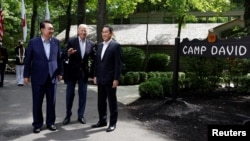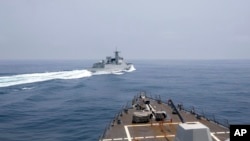China's discontent over security and economic agreements that Seoul forged with Washington and Tokyo at a Camp David summit leaves open a possibility it could respond with coercive economic and military measures against South Korea, experts say.
During last week's summit at the U.S. presidential retreat of Camp David, South Korea agreed with the U.S. and Japan to hold regular meetings to put into practice security and economic measures, bringing trilateral ties closer than ever before.
In a statement, the three leaders reaffirmed the "importance of peace and stability across the Taiwan Strait."
Beijing has often warned Seoul and Japan not to be drawn into the Taiwan issue.
"It was natural that we would discuss some of the concerns and issues related to actions carried out by the PRC that are of significant concern to our three countries and to many others around the region and around the world," said Daniel Kritenbrink, U.S. assistant secretary of state for East Asian and Pacific affairs, at a news briefing on Tuesday.
Also at the briefing, Kurt Campbell, U.S. national security coordinator for the Indo-Pacific, said the security environment in Asia has "caused anxiety" for Japan and South Korea. He highlighted Russian and Chinese warships operating in waters near Japan, China's "massive" military buildup, which he described as "provocative," and North Korea's missile launches.
Daniel Russel, who served as the U.S. assistant secretary of state for East Asian and Pacific affairs in the Obama administration, said, "China is more likely to inflict economic punishment against [South] Korea if it believes the government in Seoul can be bullied into making concessions."
He continued, "Nothing in the Yoon administration's first year in office suggests that such a strategy would work. However, if Beijing believes it can exploit the kind of domestic differences on policy that are normal in democracies, we might see an uptick in disinformation and manipulation efforts."
Military aggression
Some believe the potential for military aggression by Beijing cannot be discounted.
As the trilateral agreements are put into practice, China could "start sending submarines and other warships into the South Korean exclusive economic zone in regular transits, trying to establish its right to be in that area," said Bruce Bennett, a senior defense analyst at the RAND Corporation research group.
Chinese and Russian aircraft have frequently entered South Korea's air defense zone, including in June when Seoul sent fighter jets to ward them off.
David Maxwell, vice president of the Center for Asia Pacific Strategy, said, "China has really driven South Korea and Japan together, just as North Korea has" moved the countries toward each other, and has led them, along with the U.S., into closer trilateral economic and security ties.
He continued, "The more China does, either security- or economic-wise, the closer the three countries will be, because [Beijing] is not going to be able to break the relationship with its action, its coercion. Chinese coercion is just going to make the relationship stronger."
When the U.S. THAAD missile defense system was deployed to South Korea in 2017, Beijing retaliated by banning South Korean Lotte Group supermarkets in China and suspending Chinese tourism to South Korea.
This time, however, experts think even if China were to retaliate economically, it would be different.
"China's own economy is in trouble," Maxwell said. "Like-minded democracies and free-market economies are likely to work together to prevent China from conducting any kind of successful economic warfare."
During the trilateral summit, Washington, Seoul and Tokyo agreed to set up an early-warning system to prevent disruptions in global supply chains. Also, at a Hiroshima summit in May, the G7 leading industrial nations agreed to cooperate in supporting countries that become victims of China's economic practices.
Beijing unleashed harsh criticism of the latest trilateral agreements, even as it acknowledged that Seoul had explained the summit results.
"Following the U.S.-Japan-ROK summit at Camp David, the ROK briefed China on the meeting and explained it through diplomatic channels," said Chinese Foreign Ministry Wang Wenbin at Tuesday's briefing.
"We urge relevant countries to be prudent with words and actions, stop smearing China's image and harming China's interests," continued Wang. "We hope that the ROK will join China and other countries in the region in rejecting the outdated pattern of division."






